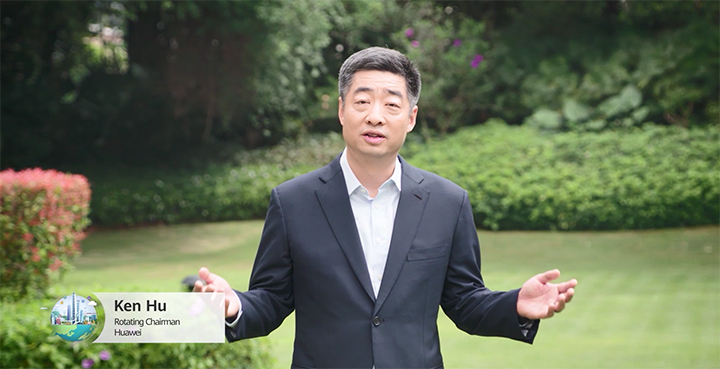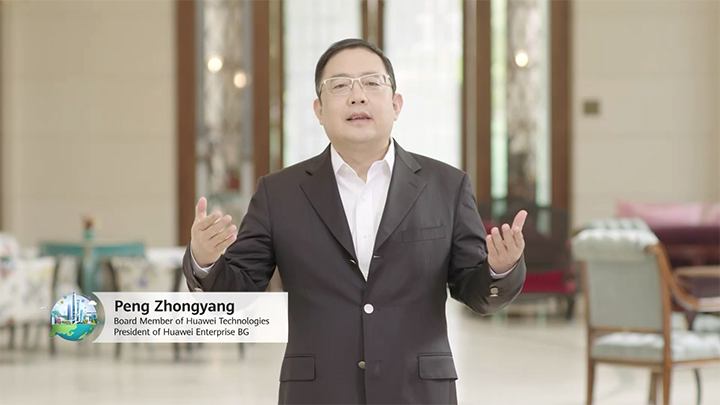Produkty, Rozwiązania i usługi dla przedsiębiorstw
[Shenzhen, China, March 24, 2021] Today, Huawei holds its online Industrial Digital Transformation Conference, themed "New Value Together". Nearly 50 customers and partners from more than 10 countries and regions shared their industrial practices and jointly explored the new value of digital transformation in the post-pandemic era.

Mr. Ken Hu, Huawei's Rotating Chairman
In his speech, Mr. Ken Hu, Huawei's Rotating Chairman, pointed out that digital transformation is speeding up across industries, and full cloud adoption will happen 1 to 3 years earlier than expected. Going digital is no longer just for internet companies. It's expanding to traditional industries, and from the office to the production floor. We'll keep innovating in technology and scenario-based solutions to help all industries take advantage of this opportunity.
So far, Huawei has built 13 Open Labs around the world to support joint innovation. In places like Munich and Dubai, the company is working with almost 900 ecosystem partners to incubate different solutions for industrial scenarios. To date, it has successfully verified more than 60 solutions in areas ranging from smart retail to smart manufacturing. On the technology side, Huawei is innovating in areas like smart campuses, deterministic networks, hyper-integrated data centers, smart clouds, and green energy to lay the foundation for an intelligent future.
Ideas and models must be tested in real situations. After years of practice, Huawei has proposed a value-driven model for industrial digitalization. Huawei maintains that digital transformation should be focused on actual business use and scenarios, which can then be used to create value for customers through continuous improvement.
In his keynote speech, Mr. Peng Zhongyang, Board Member, President of Enterprise BG, Huawei, stressed that three basic principles must be followed during digital transformation. First, companies must continue to be customer-centric, which is the starting point of digital transformation. Secondly, they must seize two key factors: the convergence of technologies and scenarios is the key to digitalization, while cloud is critical to continuous optimization and value creation in the digital era. Thirdly, businesses should focus on customer requirements to build a symbiotic and shared digital ecosystem from three dimensions: scenario exploration, capacity building, and a cooperation model to jointly create new value for industries.
New challenges and uncertainty will emerge in the post-pandemic era. Huawei will be more open and continue to work with our 30,000 global partners to complement each other's strengths and help overcome new challenges.

Mr. Peng Zhongyang, Board Member, President of Enterprise BG, Huawei
Huawei is committed to working with customers and partners to integrate core business scenarios with ICT technologies, and accelerate industrial digitalization and upgrade through scenario-specific, innovative solutions. This is also the key to the digitalization of the industry.
In the finance sector, through joint innovation with partners, Huawei has provided NCBA Bank Kenya, the largest commercial bank in the East African sub region, with a new digital core system. The system provides inclusive financial services for more than 18 million users in Kenya and neighboring countries, empowering the real economy and promoting sustainable social development. Eric Muriuki Njagi, Director of NCBA Digital Services, said: "Our cooperation with Huawei aims to solve current problems as well as grasp new opportunities brought by future services."
In the transportation sector, Dr. Georgia Ayfantopoulou, Research Director Intelligent Infrastructure, Networks, Mobility & Logistics; Deputy Director Hellenic Institute of Transport (HIT) of Center for Research & Technology Hellas (CERTH), took Europe as an example and shared the situation of digital transformation of port construction. European Union (EU) ports offer services to a global maritime fleet (Greece, for example is ranked first with a share of 17% of the world fleet in 2020). Seaports and the shipping industry are an important nexus of the EU economy, but are facing challenges such as structural performance gaps, lack of high-quality infrastructure at ports and other low-performing services. To address this, the EU has formulated a strategic agenda for the European ports, focusing on maritime infrastructure as part of raising EU’s global competitiveness.
In this context, the Green Port Proposal has been developed in collaboration between CERTH and Huawei. Dr. Georgia Ayfantopoulou said: "The Green Port project is deeply involved in the transformation process of the ports’ ecosystems: the users of the ports together with the port’s authorities, the cities try to solve problems of accessibility, efficiency, operation optimization and environmental impact. Ports of the future are sustainable, smart, multimodal and interconnected. Technology solutions from partners like Huawei will contribute to efficiently meeting various challenges."
In the education sector, Soochow University partnered with Huawei to jointly build a "Cloud-based Soochow University" that is digital and intelligent. With this project, all people, environments, objects, as well as academic and cultural activities in the campus are digitalized and mirrored on the cloud, allowing for digital integrations in teaching, scientific research, and management.
Xiong Sidong, President of the Soochow Iniversity, remarked in his keynote speech: "Soochow University and Huawei have applied cutting-edge technologies such as AI, big data, cloud computing, and IoT in the planning and construction of a cloud-based campus for information exchange and data sharing. Our aim is to shape a new form of university that is built with future technology and integrates reality and virtual interactions."
In the energy industry, Gao Kunlun, CIGRE Study Committee D2 Regular Member, and Vice President of the Global Energy Interconnection Research Institute, pointed out that in recent years, AI is gradually being applied in many fields, such as equipment maintenance, power grid operation, and customer service. Whilst this effectively improves the efficiency and benefits of the power grid it also reveals technical limitations. With the development of AI theories and technologies, AI-powered electric power systems are now capable of knowledge learning and independent decision-making optimization in complex environments, playing a crucial part in key services such as autonomous power generation and autonomous scheduling of power grids.
From March 24 to 26, Huawei hosts the Industrial Digital Transformation Conference 2021 online, exploring the power of the resilient and innovative digital world from three perspectives: business, technology, and ecosystems. Huawei will share insights on digital transformation, and introduce business strategies, talent programs, and ecosystems that support it. We will detail practices that the business has carried out over recent years in the government, education, transportation, finance, and energy sectors, etc. We will also showcase the latest developments in areas including connectivity, cloud and AI.